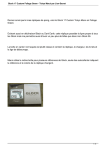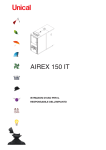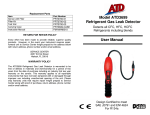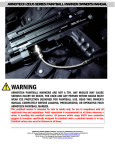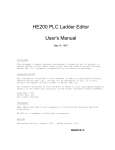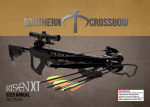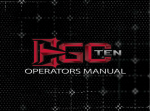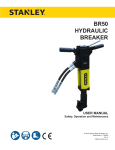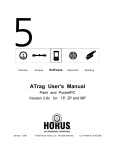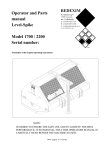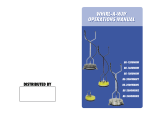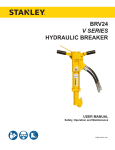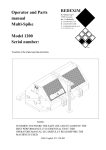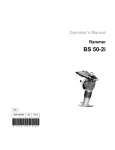Download TUNING GUIDE EGO LV1
Transcript
ECLIPSE EGO LV1 TUNING GUIDE This is a supplement to the complete Ego LV1 User Manual included with every Ego LV1 paintball marker. This manual MUST be read and understood before using the LV1 marker. De-gas your marker, discharging any stored gas in a safe direction, and remove the barrel, loader, air system and any paintballs to make the marker easier and safer to work on. Below is an operational guide we would advise users to follow when tuning the Ego LV1 marker in addition to the set-up procedure detailed in the USER MANUAL: We are highly recommending that the LV1 is NOT dry fired. That means no firing of the marker with just air if it can be avoided. The dynamics of the LV1 mean that the bolt and rammer rely heavily on the back pressure caused by the ball being fired down the barrel to reset the bolt and rammer to the rear position. Dry firing will lead to damage of the rammer bumper and potentially the rammer and body of the marker. 1 Because of the nature of the new dynamics and the increased range of adjustability of the LV1, it is far easier to upset the balance of the marker and take it out of its optimized window. This can lead to reduced efficiency, and increased wear and tear on the rammer bumper. Pay particular attention to the LPR settings and the dwell settings. 2 3 All the factory settings for the LV1 are optimised for use in cold/winter climates. Both dwell and LPR settings can be reduced when using the marker in warmer climates. This will give improvements in efficiency and feel as well as longevity of components. With a brand new Ego LV1 marker there is no need to ‘break-in’ the marker first before making these adjustments. When using the marker in cold/winter weather conditions it is recommended to reset the Ego LV1 to its factory state of tune. Attempting to use a low dwell and LPR output in cold climates may cause performance issues. 4 The LV1 does not “feel” like any other Ego when it is being fired. Without firing paint over the chronograph, DO NOT try to set these markers up by “feel” alone. We have had several reports of customers dry firing or firing paint, and “feeling” like the marker was shooting low (compared to older verisions of the Ego marker). They have then “tuned” the marker by feel and hearing to what they think sounds the correct velocity and then shot the marker. In all cases the markers have been returned to us shooting in excess of 350fps! Not only is this dangerous, but it is putting excess stress on the internals of the marker. Please be aware, this marker does not “feel” like any other marker when it is shooting paint or dry firing. Always confirm any adjustments by using a chronograph. Please contact your nearest service centre if you have any questions or issues regarding the tuning of the Ego LV1. We have produced a basic “LV1 Tuning Guide” (overleaf) that should help any techs and players that are unsure of the correct tuning procedure. © Copyright 2013 - Planet Eclipse Ltd. Eclipse and the Estar Logo Device are all either design trademarks, registered trademarks or trademarks of Planet Eclipse Ltd. All other trademarks are property of their respective owners. MAN0010 This is a supplement to the complete Ego LV1 User Manual included with every Ego LV1 paintball marker. This manual MUST be read and understood before using the LV1 marker. De-gas your marker, discharging any stored gas in a safe direction, and remove the barrel, loader, air system and any paintballs to make the marker easier and safer to work on. The Ego LV1 has a much larger range of adjustment than any previous Ego markers. As such it is relatively easy to upset the balance of the LV1 and take it out of its optimum performance window. In particular, this can have a notable effect on efficiency. Below is a detailed guide on how we would advise users to tune their LV1’s beyond the factory state of tune that the marker is originally shipped with: PRIOR TO TEST 1 Adjust the REAR solenoid flow restrictor on the solenoid assembly to a level of 7 or more as this has been proven to improve efficiency compared to the stock settings. 2 Reset the LPR, HPR and dwell to factory recommended settings as found in the Manual. 3 Make sure the tank is full or has at least 2500psi in it. 4 Make sure the paint isn’t too small in the barrel or shooting very inconsistently. Check the paint in other markers if the readings are poor over the chronograph. 5 Make sure the bolt is very smooth in the breech. There should be virtually no friction between the bolt and body of the marker. Oil or replace the 14x2 o-rings on the bolt as detailed in the ‘Cure5 Bolt Assembly’ maintenance section of the User Manual Please contact your nearest service centre if you have any questions or issues regarding the tuning of the Ego LV1. TUNING THE DWELL 1 Set everything to the factory setting; setting the dwell to 16.8ms and the LPR adjuster screw to one turn out from fully in. 2 Take your marker, paint, barrel and tank that you are using to the chronograph. Tune the Ego LV1 with the paint you intend to shoot that event. 3 Chronograph the marker to 280-290fps (or the fps enforced by law or event rules) using the Inline Regulator as primary means of adjustment. 4 Once at 280-290fps go to dwell parameter mode. 5 Fire 3-4 shots over the chrono, then lower the dwell by 0.5ms and then fire 3-4 more shots. 6 If the velocity remains in the 280-290fps region, repeat step 5). 7 Keep repeating steps 5) and 6) until you see the velocity drop from the 280290fps region that the marker was chronographed at to start with. 8 Once the velocity has started to drop STOP lowering the dwell and now INCREASE the dwell by 0.5ms. 9 Fire several shots over the chronograph to ensure that the velocity is consistently back in the 280-290fps region. 10 The dwell is now tuned for that marker setup. TUNING THE LPR 1 After tuning the dwell it is worth checking to see if the LPR can be reduced further. The principle is as above, but using the LPR adjuster screw. 2 Fire the marker over the chronograph and then turn the LPR adjuster in/ clockwise (LPR pressure down) 1/8th of a turn. 3 Chronograph the marker again and check the velocity and consistency. 4 If the velocity is unchanged, reduce the LPR setting a little further. 5 Repeat steps 2-4 until the velocity starts to drop, then increase the LPR pressure back UP 1/8th of a turn. 6 Fire a few shots to make sure everything is consistant. After a full set-up such as this the marker will need to be kept clean and correctly lubed, paying particular attention to the bolt and keeping that smooth. It should also be noted that further adjustments may be required if there is a significant change in the weather or paint being used.


